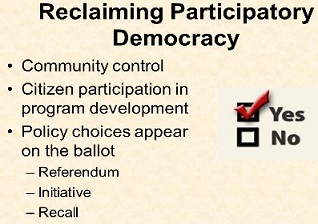In political terminology, the initiative is a process that enables citizens to bypass their state legislature by placing proposed statutes and, in some states, constitutional amendments on the ballot. The first state to adopt the initiative was South Dakota in 1898. Since then, 23 other states have included the initiative process in their constitutions. In 1911, California voters approved the constitutional processes of initiative, referendum, and recall. Through these processes, voters can adopt a change in law (an initiative), disapprove a law passed by the Legislature (a referendum), or remove an elected official from office (a recall)."
CALIFORNIA’S RECALL IS RIDING A GLOBAL WAVE 
From Nigeria to Brazil, Democracies Are Experimenting With New Ways for People to Hold Their Elected Officials Accountable.
Aug. 3.– The recall attempt against Gov. Gavin Newsom is being widely—and wrongly—dismissed as a peculiar and illegitimate consequence of California’s strange direct democracy.
The truth is that the recall is very much a piece of a large and desperate global search for tools to hold powerful elected leaders accountable.
You can see the hunger for methods—any methods—to remove faltering officials in every corner of the world.
Recently, for example, a leading Nigerian scholar, Maduabuchi Ogidi of the Alvan Ikoku Federal College of Education in Owerri, wrote in infuriating detail how the democratization of his country has produced ceaseless corruption, misappropriation of public funds, abuse of public office, and books’ worth of unfulfilled electoral promises.
How, he asked, might everyday Nigerians end this cycle and bring accountability to their democratically elected leaders?
(...)
[ Full text ]
Comments powered by CComment